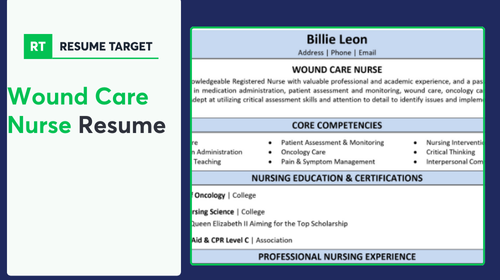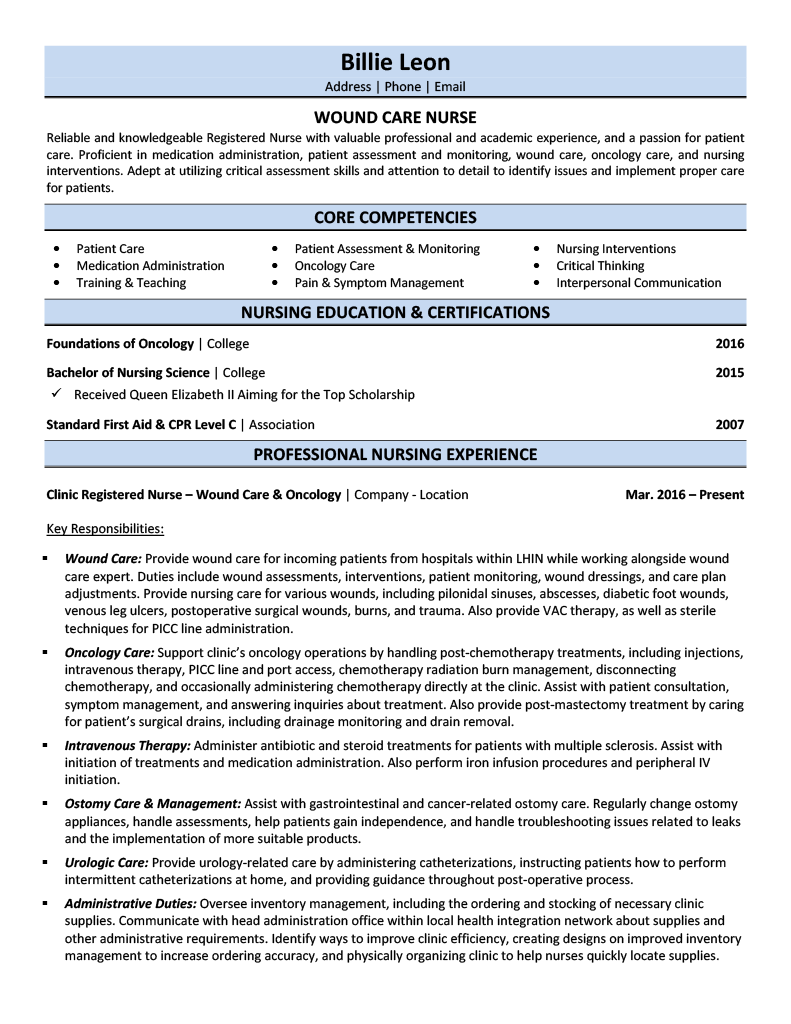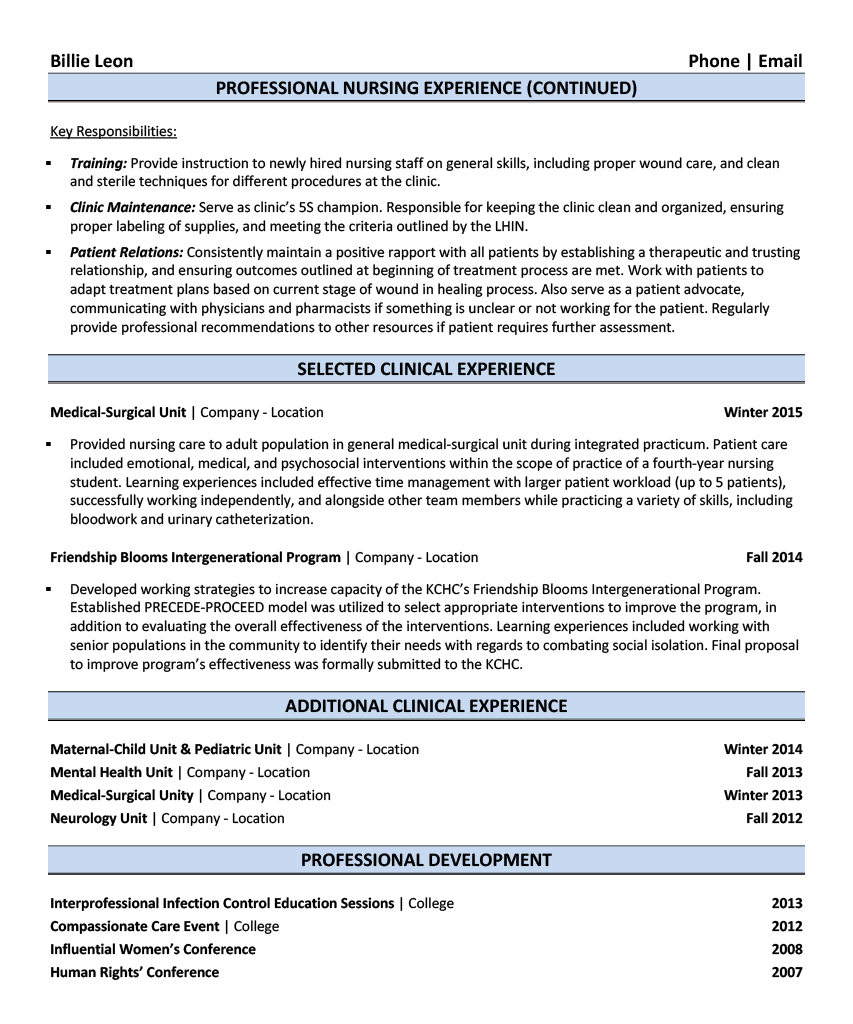

Wound care expertise is complex, but explaining it on paper shouldn't be. Many wound care nurses struggle to translate their specialized skills and treatment successes into compelling resume content.
Are you finding it challenging to showcase both your clinical expertise and patient outcomes? Your resume needs to demonstrate your advanced wound care knowledge while highlighting the real improvements you've achieved in patient healing rates and recovery times.
Resume Target specializes in helping wound care nurses transform clinical achievements into powerful career documents. We know how to present your specialized skills, certification credentials, and healing success rates in a way that catches hiring managers' attention and leads to interviews.


As healthcare's specialized healing experts, Wound Care Nurses transform complex injuries into success stories, managing everything from surgical wounds to chronic ulcers with precision and expertise.
Your role combines clinical excellence with detective work as you assess wounds, develop customized treatment plans, and collaborate with healthcare teams to implement the latest evidence-based healing techniques - all while providing compassionate education to patients and their caregivers about proper wound management.
Whether you're just starting your nursing career or looking to specialize, the path to becoming a Wound Care Nurse offers exciting opportunities to advance your skills, earn specialized certifications, and make a tangible difference in patient recovery outcomes.
Let's talk about what's exciting in the world of Wound Care Nursing! Your specialized skills in wound care can lead to an impressive earning potential, with opportunities to significantly increase your income through certifications and advanced expertise. And guess what? The field offers remarkable growth potential as you gain experience.
Figures from: Joyce Education
Wound Care Nursing offers a clear path from bedside care to leadership roles. With the right certifications and experience, you can progress from basic wound care to managing entire departments or becoming a specialized educator.
Beyond basic nursing skills, advancing in wound care requires mastery of specialized techniques, certification expertise, and leadership capabilities that set you apart in this growing field.
- Advanced wound assessment and documentation - Specialized dressing application techniques - Wound care product expertise - Patient education and communication - Team leadership and coordination - Electronic health record proficiency - Treatment protocol development - Quality improvement management - Interdisciplinary collaborationTo launch your wound care nursing career, you'll need to first become a registered nurse (RN) through an accredited nursing program and gain at least 2 years of clinical experience in acute care settings.
Your path to becoming a specialized wound care nurse will require developing strong communication skills for effective patient education, which you can start building in your initial RN role.
Requirements from CareRev
From bustling hospitals to home health services, wound care nurses find opportunities across healthcare settings nationwide.
Figures from Vivian Health
Struggling to showcase your wound care expertise, patient outcomes, and specialized certifications in a way that catches a hiring manager's attention? This comprehensive, section-by-section guide will walk you through creating a powerful wound care nurse resume that highlights your clinical skills and patient care achievements.
As a Wound Care Nurse, you know how to heal complex wounds, but crafting the perfect resume summary can feel like a challenging procedure without the right approach.
While you excel at developing treatment plans and providing specialized wound care interventions, translating these vital clinical skills into compelling written statements that catch a hiring manager's attention requires a different kind of expertise.
How would you describe your overall approach to wound care management and the breadth of wound types you're most experienced in treating?
Reason: This helps establish your clinical expertise level and specialized focus areas right at the start of your summary, giving employers immediate insight into your wound care scope of practice.
What unique combination of wound care certifications, specialized training, and interdisciplinary collaboration skills defines your nursing practice?
Reason: This question helps you articulate your professional credentials and collaborative abilities in a way that distinguishes you from other wound care specialists.
How would you characterize your philosophy on patient education and family involvement in the wound healing process?
Reason: This helps showcase your holistic approach to wound care and emphasizes the crucial patient education component that employers value in wound care specialists.
As a Wound Care Nurse, your skills section needs to demonstrate both your clinical expertise in wound assessment and treatment, as well as your ability to provide compassionate patient care and education.
Your resume should showcase specialized skills like wound debridement techniques and VAC therapy knowledge, alongside essential nursing competencies such as documentation, infection control protocols, and interdisciplinary collaboration.
Showcase your specialized wound care expertise by organizing your experience into three powerful sections: a concise role overview highlighting your clinical settings, measurable achievements demonstrating your healing outcomes, and core responsibilities that spotlight your wound assessment and treatment capabilities.
Many Wound Care Nurses struggle to effectively showcase their specialized clinical expertise and patient outcome improvements in a measurable way. Transform your wound care accomplishments into powerful metrics by connecting your specialized treatments and protocols directly to healing rates, reduced hospital stays, and decreased infection rates.
A strong responsibilities section demonstrates how Wound Care Nurses provide specialized treatment beyond basic wound dressing. Your duties should clearly show both clinical expertise and patient care coordination to hiring managers while highlighting your impact on patient outcomes and facility performance.
Your wound care credentials demonstrate your expertise in specialized wound assessment, treatment, and prevention protocols. Start with your highest nursing degree and include your Wound Care Certification (WCC) or other relevant wound care credentials, making sure to highlight any specialized training in ostomy care, compression therapy, or diabetic wound management.
Now that you've created a strong foundation using Resume Target's expert guidelines for resume writing, you're ready to transform your clinical credentials into a powerful job-winning document.
While many nursing professionals focus solely on customizing their cover letters, tailoring your wound care nurse resume for each position is equally crucial for showcasing your specialized expertise in wound assessment, treatment protocols, and patient education.
A customized resume not only helps you navigate through ATS systems by incorporating relevant keywords from the job posting, but it also demonstrates to hiring managers your precise alignment with their wound care unit's specific needs, protocols, and patient population.
Ready to make your wound care expertise shine? Let's transform your resume into a targeted tool that proves you're exactly the specialized nursing professional they're looking for!
Don't let limited experience hold you back from pursuing your dream role as a Wound Care Nurse!
Your nursing education, clinical rotations, and any wound care exposure during your training can create a compelling story of your readiness for this specialized role.
Focus on highlighting your nursing degree, relevant certifications like WOCN coursework, and any hands-on patient care experience from clinicals.
For more guidance on structuring your healthcare resume, check out the Student Resume Writing Guide to ensure you're showcasing your clinical skills effectively.
Your nursing education and clinical rotations have equipped you with valuable hands-on wound care experience that deserves to be highlighted front and center in your resume summary.
Focus on showcasing your specialized wound care training, certification preparations, and any relevant volunteer or internship experiences that demonstrate your dedication to patient care.
"Compassionate and detail-oriented Wound Care Nurse with clinical rotation experience and specialized training in advanced wound treatment protocols. Demonstrated expertise in wound assessment, dressing changes, and patient education during 600+ hours of clinical practice. Proficient in documenting wound progression and collaborating with interdisciplinary healthcare teams. Seeking to leverage strong clinical foundation and wound care certification preparation to provide exceptional patient care in a dedicated wound care setting."
Now's your chance to showcase the specialized training and clinical expertise that makes you an outstanding wound care professional!
Transform your nursing education into compelling content by highlighting relevant certifications like WOCN, wound care-specific coursework, and hands-on clinical rotations where you mastered advanced dressing techniques and pressure injury prevention protocols.
The following courses and certifications are common for Wound Care Nurses: * Wound Care Technician Certification (WCT) [1] * Wound Care Specialist (WCS-C) [1] * Wound Care Nurse Certified (WCN-C) [1] * Excisional Wound Debridement Specialist EDS-C [1] * Foot Care Certification FCC / FCT [1] * Conservative Sharp Wound Debridement (CSWD-C) [1]Relevant Coursework: Wound Care Technician Certification | Wound Care Specialist | Wound Care Nurse Certified | Excisional Wound Debridement Specialist | Foot Care Certification | Conservative Sharp Wound Debridement
Key Projects:
Pressure Ulcer Prevention Protocol: Developed and implemented a comprehensive wound assessment and treatment protocol for a 30-bed medical-surgical unit during clinical rotation, resulting in a 40% reduction in hospital-acquired pressure ulcers.
Diabetic Wound Care Initiative: Collaborated with interdisciplinary team to create and execute specialized diabetic foot care program in outpatient clinic setting.
Leverage your clinical training, certification coursework, and hands-on experience to showcase the specialized wound care competencies that employers seek, demonstrating your readiness to provide excellent patient care.
As an entry-level Wound Care Nurse, your specialized skills in wound management and patient care position you well for a rewarding career in this growing healthcare specialty, where expertise in healing and prevention is increasingly valued.
Let's face it - translating your hands-on wound care expertise and patient outcomes into compelling resume content can feel overwhelming, especially when you're focused on healing patients rather than writing about it.
At Resume Target, we understand the unique challenges wound care nurses face in the healthcare industry, and we've helped countless nurses showcase their specialized skills, from advanced dressing techniques to patient education programs.
Our healthcare resume experts have helped wound care specialists just like you land positions at leading hospitals and clinics across the country.
With healthcare facilities actively seeking specialized wound care expertise, now is the perfect time to transform your clinical experience into a powerful career story - let's get started with a free consultation today.
Impress any hiring manager with our Nurse resume writing service. We work with all career levels and types of Nurse professionals.
Learn More → Nurse Resume Writing Services